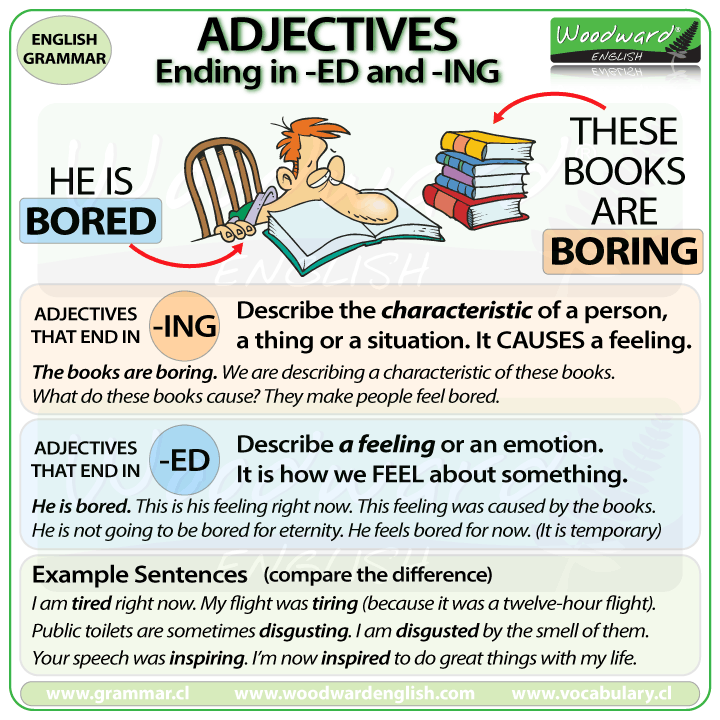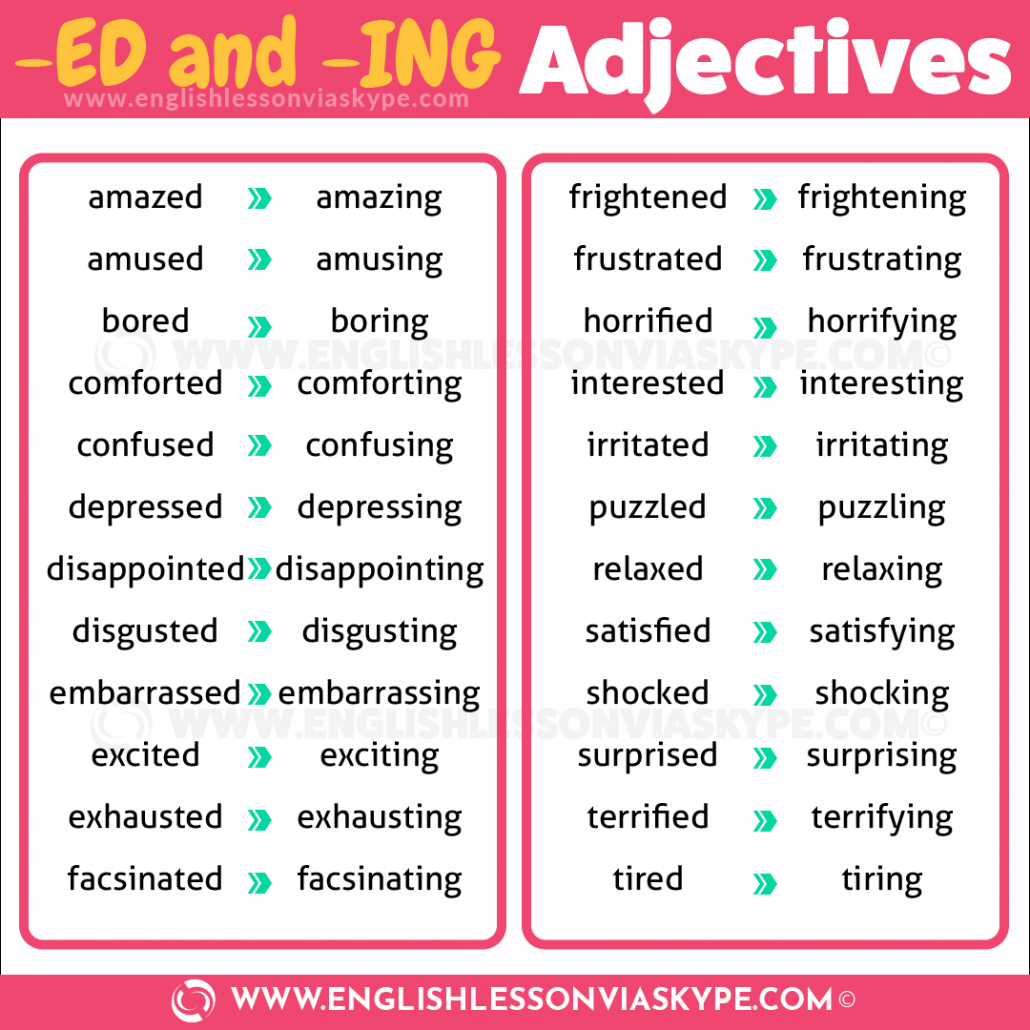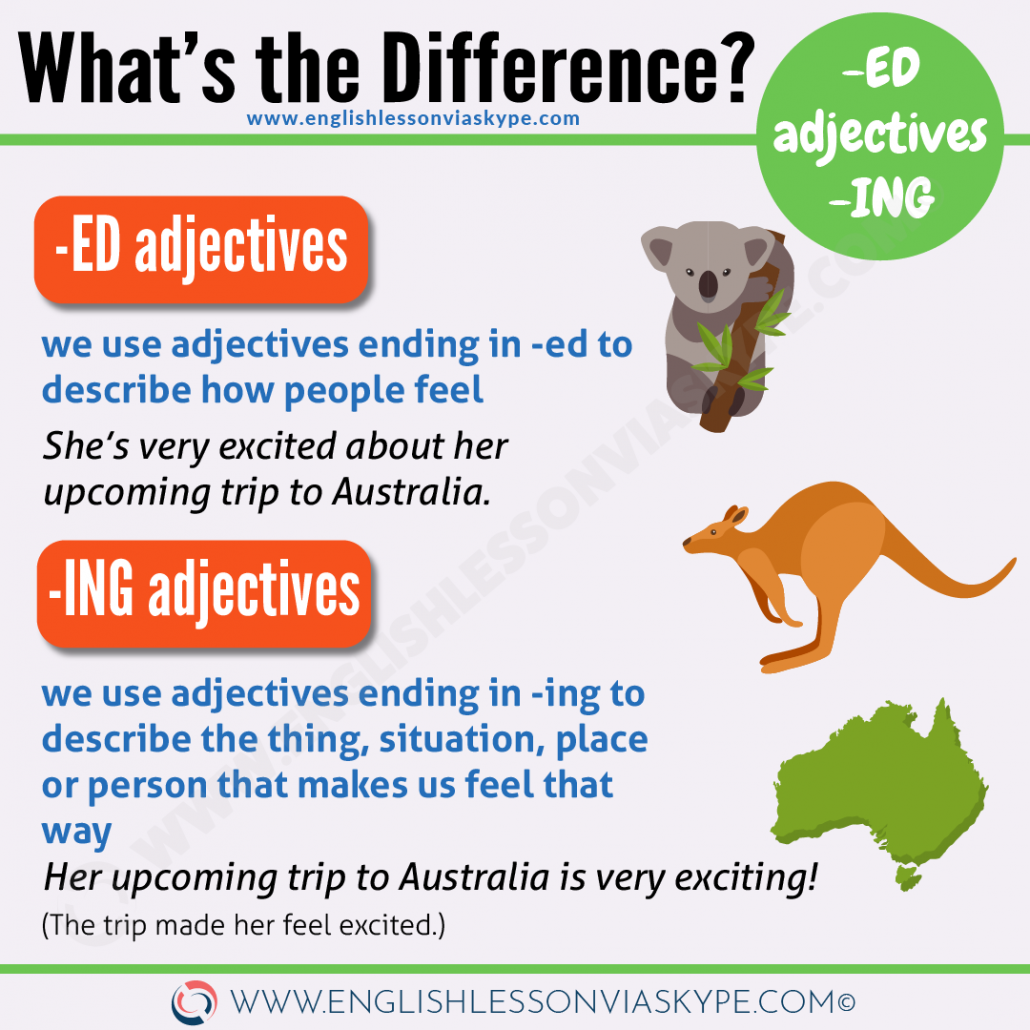Adjectives that End in -ING
In general, adjectives that end in -ing are used to describe things and situations. They have an active meaning. They describe someone that is doing something (acting) or something that is causing something to us, making us feel in a certain way.
Adjectives that End in -ED
Adjectives that end in -ed are used to describe how people feel. They have a passive meaning. They describe someone ‘receiving‘ some kind of action, made to feel in a certain.
Examples of Adjectives Ending in -ED and -ING
Space science is very interesting to her.
She is interested in space science.
The -ing adjective tells you about something (space science) . The -ed adjective tells you how somebody feels about something (She is interested in space science because it is very interesting).
Other examples:
I was disappointed with the movie. I expected it to be much better. (I felt disappointed.)
The movie was disappointing. I expected it to be much better. (It was a disappointing movie.)
We were very shocked when we heard the news. (We felt shocked.)
The news was shocking. (It was a shocking news.)
To make it clearer, let’s have a look at the following examples:
A crying baby
A running man
A sleeping cat
They all “do” something: the baby is crying, the man is running, the cat is sleeping. The –ing adjectives have an active meaning: crying, running and sleeping are used to describe an action.
Now look at these examples with adjectives ending in –ed:
A smashed window.
An interested audience
A confused man
An excited child
These adjectives are used with a passive meaning. Something has been done to the object (the window) or something/someone has caused people to be in a certain state (the audience, the man, the child) or feel in a certain way.
The adjectives smashed, interested, confused, excited describe states or feelings as a result of something done: the window has been smashed, the audience has been interested, the man has been confused, the child has been excited.
Notes | Adjectives Ending in -ED and -ING
- We can use adjectives ending in -ing for things or people. Remember that when we use adjectives ending in -ing, it is describing the person or thing.
- We can use the -ed ONLY for people (or animals) because THINGS CANNOT FEEL.
List of Adjectives Ending in -ED and -ING
Amazing – Amazed
Amusing – Amused
Annoying – Annoyed
Boring – Bored
Challenging – Challenged
Charming – Charmed
Confusing – Confused
Convincing – Convinced
Depressing – Depressed
Disappointing – Disappointed
Disgusting – Disgusted
Disturbing – Disturbed
Embarrassing – Embarrassed
Entertaining – Entertained
Exciting – Excited
Exhausting – Exhausted
Depressing – Depressed
Disappointing – Disappointed
Fascinating – Fascinated
Frightening – Frightened
Frustrating – Frustrated
Inspiring – Inspired
Interesting – Interested
Pleasing – Pleased
Relaxing – Relaxed
Relieving – Relieved
Satisfying – Satisfied
Shocking – Shocked
Surprising – Surprised
Terrifying – Terrified
Threatening – Threatened
Thrilling – Thrilled
Tiring – Tired
Touching – Touched
Worrying – Worried
Adjectives Ending in -ED and -ING | Pictures
Sample verbs of emotion:
| amuse | irritate | comfort | fascinate | puzzle | satisfy |
| annoy | surprise | depress | bewilder | excite | frustrate |
| bother | bore | tire | interest | aggravate | amaze |
| captivate | confuse | shock | intrigue | disappoint | exhaust |
Examples words used as verbs and adjectives:
This sentences uses the word "bores" as a verb.
My English class bores me.
(verb)
This sentence uses the word *bored* as an adjective.
I am bored in my English class.
(verb + adjective)
This sentence uses the word *boring* as an adjective.
The class is boring to me.
(verb + adjective)
The verb+ed becomes an adjective when it is used to describe . . .
A person or animal
A good way to remember to use -ed to describe the person or animal that experiences an emotion is to remember that both start with E. E for -ed and E for Experience. The "Experiencer's" emotion is described with ED
For example:
Susan was annoyed by her neighbor's dog.
Susan is the experiencer." She is experiencing an emotion. The word annoyed is used to describe how Susan is feeling
The verb+ing becomes an adjective when it is used to describe . . .
the thing or things
A good way to remember to use -ing to describe what instigates (causes) the emotion is to remember the two words that start with an I. I for -ing and I for Instigate. The instigator is described with -ING
For example:
The dog was annoying Susan
The dog instigated the emotion. The dog caused (instigated) Susan to be annoyed. Annoying is the adjective to describe what the dog was doing to Susan
Other helpful hints:
Sentences often use the word "by" with adjectives ending in ED
Greg was challenged by his math homework.
Sentences often uses the word "to" with adjectives ending in ING.
Greg's math homework was challenging to him.
Source: https://www.gallaudet.edu/tutorial-and-instructional-programs/english-center/grammar-and-vocabulary/adjectives/using-ed-and-ing-to-make-an-adjective
Adjectives ending in ED and ING
English Grammar Notes
There are many adjectives that we have in English that end in -ED or -ING.
Yes, that's correct, they are not only endings that we use for verbs!
An adjective that ends in -ING is used to describe: the characteristic of a person, a thing or a situation.
An adjective that ends in -ED is used to describe: a feeling (or how a person feels) or an emotion. It is used to describe a temporary thing. Since only people (and some animals) have feelings, -ed adjectives cannot be used to describe an object or situation.
Compare the difference:
- My girlfriend is bored. - (My girlfriend feels bored)
- My girlfriend is boring. - (My girlfriend is a boring person)
You can use these adjectives to describe people or situations but be careful that you are using the correct adjective. For example, there is a big difference in meaning between:
- I am confused. - (I don't understand something)
- I am confusing. - (I will cause you to be confused)
Note that the sentences below are to highlight the difference between the two types of adjectives. They are NOT common to do or say because they sound repetitive.
- I was shocked by how shocking the accident was last night.
- They were frightened by the frightening roller-coaster ride!
- I am annoyed by how annoying that person in front of us is.
- Sally was confused by the confusing street signs in the city.
Example sentences of adjectives ending in -ED and -ING
- This grammar lesson is boring. I am bored reading all about these grammar rules.
- I am tired right now. My flight was tiring (because it was a twelve-hour flight).
- Public toilets are usually disgusting. I am disgusted by the smell in some of them.
- Your speech was very inspiring. I am now inspired to do wonderful things with my life.
Also see our article about the Pronunciation of words ending in -ED.
Summary chart

List of Adjectives ending in -ED and -ING
There is quite a long list of adjectives ending in -ED and -ING in English, and most of them are based on a verb that can be changed into an adjective by adding either -ED or -ING.
Some of the more common ones include:
- Alarmed - Alarming
- Aggravated - Aggravating
- Amused - Amusing
- Annoyed - Annoying
- Astonished - Astonishing
- Astounded - Astounding
- Bored - Boring
- Captivated - Captivating
- Challenged - Challenging
- Charmed - Charming
- Comforted - Comforting
- Confused - Confusing
- Convinced - Convincing
- Depressed - Depressing
- Disappointed - Disappointing
- Discouraged - Discouraging
- Disgusted - Disgusting
- Distressed - Distressing
- Disturbed - Disturbing
- Embarrassed - Embarrassing
- Encouraged - Encouraging
- Entertained - Entertaining
- Excited - Exciting
- Exhausted - Exhausting
- Fascinated - Fascinating
- Frightened - Frightening
- Frustrated - Frustrating
- Fulfilled - Fulfilling
- Gratified - Gratifying
- Inspired - Inspiring
- Insulted - Insulting
- Interested - Interesting
- Moved - Moving
- Overwhelmed - Overwhelming
- Perplexed - Perplexing
- Pleased - Pleasing
- Relaxed - Relaxing
- Relieved - Relieving
- Satisfied - Satisfying
- Shocked - Shocking
- Sickened - Sickening
- Soothed - Soothing
- Surprised - Surprising
- Tempted - Tempting
- Terrified - Terrifying
- Threatened - Threatening
- Thrilled - Thrilling
- Tired - Tiring
- Touched - Touching
- Troubled - Troubling
- Unsettled - Unsettling
- Worried - Worrying
The verb + –ing used as an Adjective
The verb ending in –ing can be used as an adjective to modify a noun.
As an adjective, the verb + ing comes before a noun.
Examples:
- We are running short of cooking oil.
- I have to get another woodworking tool.
Examples:
- What has become of my missing kitten?
- Some countries are experiencing a dwindling population due to very low birth rates.
- There are people who doubt the disappearing rain forest contributes to global warming.
(b) The –ing adjective shows how something can affect us.
Examples:
- It was a very tiring day at the workplace.
- It’s amazing that the university student is only 16.
- That noise he’s making is getting annoying.
The verb + ing adjective can come after the following:
Examples:
a helping verb
- It was a disturbing dream I had last night.
- It is a polling day, today.
an adverb
- The movie was very disappointing.
- What she said to him was deliberately insulting.
a possessive
- We really appreciate your helping to milk the cows.
- I can't understand his behaving in a strange manner whenever there is a full moon.
- She has arranged for our going over for a game of mahjong.
Source: http://myenglishgrammar.com/lesson-18-verb-ing/2-the-verb-ing-used-as-an-adjective.html









No comments:
Post a Comment